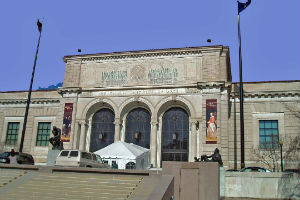The Detroit Institute of Arts’ (DIA) collection was assessed at a fair market value of between $452 million and $866 million, with 11 works on display accounting for 75 percent of the total value range.
It is a preliminary valuation by auction house Christie’s. The emergency manager of financially imperiled city of Detroit, Kevyn Orr, is considering attempting to sell off parts of the collection to reduce the city’s $18 billion debt. The city was approved to enter Chapter 9 bankruptcy this past Tuesday.
Michigan Attorney General Bill Schuette in June issued an opinion that “The art collection of the Detroit Institute of Arts is held by the City of Detroit in charitable trust for the people of Michigan, and no piece in the collection may thus be sold, conveyed, or transferred to satisfy City debts or obligations.”
According to a statement from the DIA, “The DIA continues to maintain its position that the museum collection is a cultural resource, not a municipal asset, and consequently has no comment on the preliminary evaluation report issued by Christie’s in response to the request from the Emergency Manager of the City of Detroit.”
The city of Detroit owns the museum, but a nonprofit corporation is responsible for its operation, according to a 20-year deal set to expire in 2018. Dewey Blanton, director of strategic communications for the American Alliance of Museums (AAM), called the arrangement “extremely rare.” The Christie’s appraisal assessed only those works purchased in whole or in part with city money. According to a Christie’s release, it appraised some 3,300 works of art, or about 5 percent of the museum’s approximately 66,000 works.
Orr has also reportedly stated that the museum needs to save itself by contributing money to the city, to the tune of $500 million, or he would pursue the sale of part of the collection. Museum spokeswoman Pamela Marcil declined to comment on Orr’s statement.
Blanton said the AAM stands with the DIA against the sale of its assets. “Museums are created as educational institutions for their communities, and if they’re collecting institutions, hold collections in public trust. To sell off parts of the collection every time the economy turns bad violates that trust,” he said. “If the city were to sell off the collection, it would perhaps be a short term solution to a much bigger problem and could cause further problem.”
Voters in Wayne County (which includes Detroit), Macomb County and Oakland County last year approved a property tax designated for the museum. Known as a millage tax, it is expected to generate approximately $23 million per year. In exchange, residents of those three counties receive free admission to the museum. “Voters said they like the museum so much they’re willing to tax themselves. When was the last time you heard of that?,” Blanton asked rhetorically.
Blanton also cited violation of donor intent and strictures against the monetization of collections set by the Federal Accounting Standards Board as more reasons not to disturb the collection. “To gut the museum of its power as a cultural resource and a pillar of the educational infrastructure and potential economic engine in Detroit renaissance, it would be cutting off your nose to spite your face and running counter to the sentiment of voters,” said Blanton.









